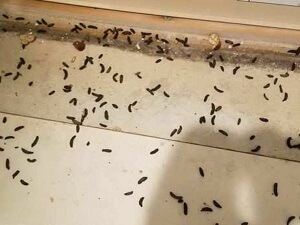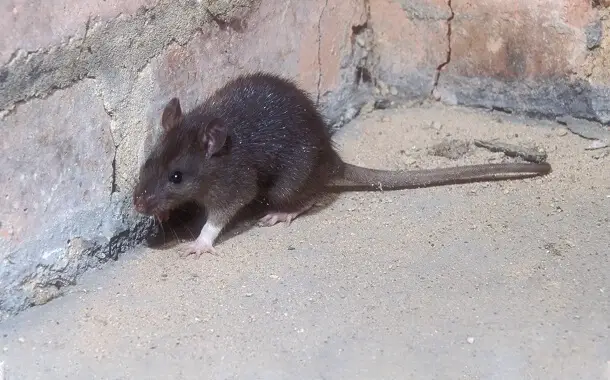How Much Does it Cost to Clean up Rodent Feces?
Last Updated on December 27, 2023
Written by CPA Alec Pow | Content Reviewed by ![]() CFA Alexander Popinker
CFA Alexander Popinker
House or pet rodents are a very large and widespread group. As a rule, they are easy to maintain and do not cost much, being preferred as pets for children. For those who love and understand them, rodents are no less than a dog or a cat. Like any animal around us, rodents can be vectors of diseases that are transmitted and manifest in humans.
As a result, cleaning efforts after a rodent infestation must be done with caution. It is important not to disturb dust particles or rodent feces in the affected areas. By sweeping or vacuuming these feces, we risk spreading dangerous particles into the air.
To get rid of these pests we can use different methods, but the most effective remains professional cleaning. Extermination is an operation aimed at eliminating rodents and preventing their reappearance and involves the use of chemicals, strong but non-toxic to humans and pets. The effectiveness of these professional extermination services against mice or rats is guaranteed and proven.
How Much Does it Cost to Clean up Rodent Feces?
The cost of cleaning up rodent feces ranges between $100 and $500 but will vary greatly from one professional to another and depending on factors like the size of the area needing to be cleaned, the type of cleaning method used, as well as the severity of the contamination. However, you should plan on spending, on average, around $260 per hour, per person.
If you only need to clean a single rodent dropping or the area that needs to be cleaned of rodent feces is small, then you can use simple household cleaners to get this done. For heavily contaminated areas and rodent control, though you will have to get a professional rodent removal service that uses something like fumigation or steam cleaning.
Attic cleaning is usually done with the help of a professional pest control company, as the area is usually large and full of hard-to-reach places.
You might also like our articles about the cost of roach, ant, or termite removal.
It is also better to just hire a professional cleaning company if you are worried about the health risks associated with the task or if you have no idea how to properly clean up and dispose of rodent feces. They already have the equipment and experience needed to properly clean the area in a safe and effective way.
Your homeowner’s insurance policy may cover some or all the expenses associated with cleaning up the rodent faces, depending on the circumstances surrounding a rodent infestation in your residence. For instance, the Eco Bear professional has experience in assisting homeowners to make claims for compensation associated with various types of biohazard remediation, including rat feces cleanup.
Overview of Diseases Potentially Spread by Rodent Feces
Deer mice are the main carriers of hantavirus, but other rodents such as white-footed mice, silk mice, and rice mice are also carriers. The virus can become fatal and can be found in deer mouse feces, urine, and saliva.
Hantavirus is transmitted to humans through particles scattered in the air and the symptoms are those of a common cold. However, people with this virus must request urgent medical assistance, after detection. Prevention of the disease is done by eliminating rodents from the home, rigorous hygiene, and preventing contact between wild and pet rodents.
Lymphocytic choriomeningitis (CML) is an infection transmitted by the house mouse. It is estimated that about 5% of known house mice can carry this virus and can also infect other rodents such as hamsters.
Transmission of the virus is through the same routes as Hantavirus, only through contact with rodents. Whether or not person-to-person transmission is possible has not yet been reported, but there may be a mother-to-fetus risk.
 CML infection has two phases. The first time it manifests easily with general symptoms such as fever, lack of appetite, muscle and headache pain, nausea and vomiting, sore throat, cough, pain in the joints, chest, testicles, or salivary glands.
CML infection has two phases. The first time it manifests easily with general symptoms such as fever, lack of appetite, muscle and headache pain, nausea and vomiting, sore throat, cough, pain in the joints, chest, testicles, or salivary glands.
The second phase already becomes more serious because the infected people also start to present neurological symptoms such as meningitis, encephalitis, or meningoencephalitis. They can be treated if they are discovered early, but they definitely require hospitalization. Otherwise, the effects can be fatal.
Salmonellae bacteria can colonize the intestinal tract of many pet and wild rodents. Humans come into contact with the bacteria by touching the faces of carrier animals or by consuming contaminated food or water. Salmonellosis is characterized by severe enterocolitis, vomiting, fever, and in more severe cases, septicemia. Children under 5 and the elderly can have major complications. Hand hygiene after handling pet rodents is the best preventive measure.
The bacteria Streptobacillus moniliforms and Spirillum minus are found in the normal flora of the mouth and nose of rats. In humans, they produce rat-bite disease or fever. Infection sets in in about 10% of cases of rat bites or scratches. Symptoms, which appear 2-10 days after the incident, include headache, malaise, chills, fever, muscle pain, rash at the site of the wound, joint pain, and in more serious cases pneumonia, endocarditis, enteritis, etc.
Leptospirosis is the most common disease transmitted by rats and is specific to both animals and humans. We can come into contact with this disease when we come into contact with water, food, or soil contaminated with the urine or feces of infested rodents. The symptoms are very similar to the flu and appear after an incubation period of 20 days. It is essential that the disease is treated early or it will worsen and turn into kidney failure, hepatitis, or meningitis.
How to hire a professional rodent droppings cleanup service?
When selecting a rodent droppings cleanup service, the price is not the only thing to consider. You must also take into account other factors such as:
- chemicals and products used to sanitize and clean up areas contaminated with rodent droppings;
- personal protective gear and other equipment used to safely clean up rodent feces.
- experience of the rodent cleanup service provider.


Leave a Reply
Want to join the discussion?Feel free to contribute!